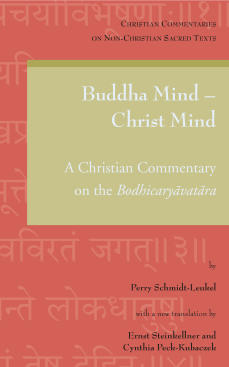Buddha Mind – Christ Mind
Perry Schmidt-Leukel presents a Christian commentary on the Dalai Lama’s favorite scripture

Buddha Mind – Christ Mind, the new book by religious studies scholar and theologian Perry Schmidt-Leukel from the Cluster of Excellence “Religion and Politics”, is a Christian theological commentary on the Bodhicaryāvatāra, an Indian Buddhist classic from the 7th or 8th century. The Bodhicaryāvatāra (“Entering the Course towards Awakening”) is a manual for those who follow the path of a Bodhisattva, that is who wish to become a Buddha not for their own sake but for the sake of all suffering beings. It is a text which rapidly became extremely popular throughout the Buddhist world and especially in Tibet. Today it is the most widely translated Buddhist text and the favorite scripture of the Dalai Lama.
Schmidt-Leukel, one of the principal investigators of the Cluster of Excellence, on the working process: “I’ve read this text again and again throughout my life. But only during the production of the commentary I realized the profound parallels between this formidable scripture and some central theological motifs of Paul, especially between what Paul calls the conflict between Spirit and Flesh and what the Bodhicaryāvatāra presents as the fight between the Spirit of Awakening and the Defilements. This text is a deeply moving testimony of Buddhist spiritual existence and it resonates strongly with the heart of Christian life.” To him this was a “striking discovery”, says Schmidt-Leukel. “I see it as strong evidence that Buddhism and Christianity are inspired by the same transcendent source.”
Interreligious Commentaries
Writing this commentary became only possible through the establishment of the academic series “Christian Commentaries on Non-Christian Sacred Texts” by Prof. Catherinne Cornille (Boston College) in 2006. “Writing transreligious commentaries requires a strong hermeneutic sensitivity,” says Schmidt-Leukel. “We need to do, as much as possible, full justice to the intention of the text and its original context and at the same time find ways how it may be related to a different religious tradition. If we succeed, transreligious commentarial writing can give precision, discipline and depth to interreligious dialogue.”
According to Schmidt-Leukel, writing the commentary took six and a half years, one and a half years of this were funded by an Opus Magnum grant of the Volkswagen Foundation. Also, much research of the previous cluster phase has been invested into this project. “The text is so rich. It also touches on various issues of political relevance, such as principal issues of ethics like free will, the possibility of genuine altruism and even questions such as the justification of violence,” Schmidt-Leukel explains. “But to me its most appealing features are its remarkable wisdom and its philosophically grounded worldview. The commentary is accompanied by a new English translation of the Sanskrit root text, which was produced by Ernst Steinkellner, Professor emeritus of the University of Vienna and one of the most renowned experts in the world of Indo-Tibetan Buddhism.
On October 17th the Austrian Academy of Sciences will host a book launch in Vienna (Aula am Campus, Spitalgasse 2, 1090 Wien, Hof 1.11, 17.00). (exc/sca)
Reference: Buddha Mind – Christ Mind. A Christian Commentary on the Bodhicaryāvatāra. With a new translation by Ernst Steinkellner and Cynthia Peck-Kubaczek (Christian Commentaries on Non-Christian Sacred Texts 9), Leuven: Peeters 2019.

